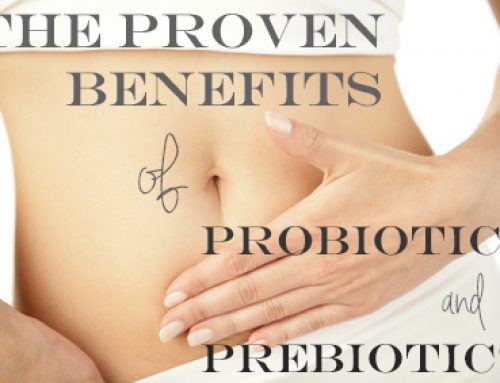It has become clear in the recent years that the next major exploration in human health and performance will be and the answer might be the gut! Having a good gut health has a positive impact on mental function and overall health. Probiotics and prebiotics help restore the balance of good and bad bacteria.
Research shows that the bacteria in the gastrointestinal tract or the gut can have a great influence in your health and athletic performance. The intestinal tract contains hundreds of kinds of bacteria that are important to your health. These are the factors that disrupt the critical balance between the “good” and “bad” bacteria in the gut when exposed to antibiotics, stress and even the kind of food that you eat.
This balance is an important factor the digestive health but there is a discovery that it also affects the brain as well.
If you are not healthy,energetic and mentally balanced, the one reason to be blamed lies on your guts.
How can probiotics can help and what are the surprising benefits of probiotic goods and supplements on brain health and mental well-being? Let us examine the factors that affect the gut bacteria levels.
What are probiotics?
In 1965, the term probiotics was coined and derived from the Latin “pro-” which means “for” and the Greek “-biotic” which means “life.”
For World Health Organizations, probiotics means “live microorganisms which when administered in adequate amounts confer a health benefit on the host.”
It is also well-defined as a type of non-digestible fiber compound. Just like other high-fiber foods, prebiotic compounds includes the kind of food that is found in garlic, Jerusalem artichokes, jicama, dandelion greens and onions, that pass through the upper part of the gastrointestinal tract and remain undigested, since the human body cannot fully break them down. Once it passes through the small intestine, it reaches the colon, it is fermented by the gut microflora.
Prebiotics are also known as a type of fiber called “oligosaccharides.” As of the moment, researchers refer to “fiber” as not only one substance but as a whole group of different chemical compounds found in foods which includes fructo-oligosaccharides, other oligosaccharides or prebiotics, inulin and polysaccharides.
Formerly, prebiotics were not classified as fiber compounds but current research has shown that the compounds act like the same with other types of fiber. As of now, prebiotic carbohydrates that have been assessed in humans that mostly consist of fructans or galactans, which are fermented by anaerobic bacteria in the large intestine.
Probiotics can take the form of supplements or foods that contain beneficial bacteria. The intestines house over 100 trillion bacteria of around 500 different species. The bacteria are referred to as the gut or intestinal flora,microbiome or microbiota.
How does prebiotics and probiotics work together to improve overall health?
Probiotics’ benefits have been known widely throughout the years especially with the growing reputation of fermented foods as of today like sauerkraut, kombucha and kimchi while prebiotics is still under observation. Plant plays a vital role in nutrient absorption, gut and digestive health from all types of fiber that we eat from eating whole. Prebiotics combined with probiotics reveals the possibility of levels of health that can make everyone to afford to sustain in the daily diet.
When the prebiotics go through the stomach without being broken down by gastric acids or digestive enzymes which brings positive development in the digestive tract and organs. The prebiotic compounds become the “fuel” or the nutrient sources for the good bacteria that lives in the gut.
Prebiotics and probiotics work together since it allows fermented ingredients that produce good bacteria that allows changes to take place in the activity and composition of the gastrointestinal system. It has an essential role in preserving health by maintaining balance and diversity of intestinal bacteria which increases the presence of “good bacteria” called lactobacilli and bifidobacteria.
The health of the gut is meticulously tied to many other bodily functions, prebiotics and probiotics together are important for battling inflammation and lowering overall disease risk.
What are the benefits of higher intakes of prebiotics?
- Lower risk for cardiovascular disease
- Healthier cholesterol levels
- Better gut health
- Improved digestion
- Lower stress response
- Better hormonal balance
- Higher immune function
- Lower risk for obesity and weight gain
- Lower inflammation and autoimmune reactions
7 Benefits of Prebiotics
-
Better Gut Health
Prebiotics is said to quicken the growth of the good bacteria or the probiotics that are found in the gut microflora. Prebiotic compounds supports the balance of harmful bacteria and toxins living in the digestive tract since it acts like food and it gives a number of health implications like improving digestion. According to research, the higher intake of prebtiotic foods increases the probiotic microorganisms consists of Lactobacillus rhamnosus GG, L. reuteri, bifidobacteria, and certain strains of L. casei or the L. acidophilus-group.
As a source of survival, good bacteria in the gut uses fiber from the foods that is eaten which would otherwise be non-digestible. As the gut bacteria metabolize otherwise non-digestible fibers from foods, it produces those short-chain fatty acids that help in many ways.
Burytic acid is one of the beneficial fatty acids which improves the health of the intestinal lining. Short-chain fatty acids benefit in regulating electrolyte levels in the body which includes sodium, magnesium, calcium and water that are important for proper digestion, producing bowel movements and preventing diarrhea.
A shift in the gut microbiota composition are being considered as one of the many factors involved in the development of the inflammatory bowel disease or irritable bowel syndrome. A report from 2012 which was published in The Journal of Nutrition states that prebiotics together with probiotics can cure digestive problems like:
- Diarrhea (after taking antiobiotics)
- Intestinal infections and chronic disorders like Crohn’s disease and ulcerative colitis
- Sypmtoms of irritable bowel syndrome (IBS)
- Inflammatory bowel disease
- Leaky gut syndrome
- Candida virus
-
Enhanced Immune Function and Cancer Protection
Numerous of human intervention studies have showed that consuming prebiotic-containing food products can result in significant changes in the composition of the gut microbiotia that help improve immunity. The “prebiotic effect” has been associated with modulation of biomarkers and activities of the immune system which adds up reduction of the concentration of cancer-promoting enzymes and putrefactive (bacteria) metabolites in the gut.
Prebiotics aids in the “advancement of stool quality like the frequency and consistency, it cut downs the risk of gastroenteritis and infections, it improves general well-being and it also reduces the incidence of allergic symptoms,” a report from The British Journal of Nutrition. Prebiotics and probiotics boost immunity because it boosts the ability to absorb vital nutrients and trace minerals that comes from the food that we eat. It also effectively lowers the pH in the gut which inhibits the growth of potential pathogens or damaging bacteria. According to research, there is a lot of promise in boosting the immune system when the probiotics and prebiotics are consumed together.
Not only that but it also enhances the immunity includes offering prevention or treatment for urinary tract infections, vaginal yeast infections, digestive disorders, colds, flu, cognitive disorders and worst like cancer like colon cancer. Why colon cancer? It is often associated with toxic load, colon cancer is the best example of a pathology that a role of gut microbiota composition that has been hypothesised. Studies shows that a reduction of the incidence of tumors and cancer cells after consuming specific food products that has a prebiotic effect.
-
Lower Inflammation
Prebiotics is also known to lower inflammation which is also the root causes of diseases and one of the world’s #1 killer is heart disease. People that are consuming more prebiotics and in general eating a high-fiber diet, tends to have healthier cholesterol level and lower risk markers for cardiovascular diseases.
When probiotics and prebiotics work together, this enhances the metabolic processes that are connected with obesity and type-2 diabetes. It is also proven that a better gut environment shuts down autoimmune reactions which supports the body to metabolize nutrients like fats and normalizes hormonal and immune functions that restricts how and where the body stores fats including in the arteries.
-
Reduced Risk for Heart Disease
The absorption of foods high in prebiotics can reduce glycation that increases free radicals, triggers inflammation and lowers insulin resistance.
Hypo-cholesterolemic effect that is from the prebiotics that improves the body’s ability to prevent ischemic heart diseases and autoimmune diseases. It also balances the body’s electrolyte and mineral levels like potassium and sodium that is also responsible for controlling blood pressure.
-
Help with Weight Loss or Maintenance
Latest data from human and animal studies support the beneficial effects of particular prebiotic food products with better energy homeostasis, satiety regulation and lower body weight gain. Higher intakes of any types of fiber is known to lower body weight and protection against obesity.
According to a 2002 study from The British Journal of Nutrition says that prebiotics foods promotes a sense of fullness or satiety, prevent obesity and spur weight loss. The effects it has in the hormone levels are highly related to appetite regulation, it is showed in the animal studies that when given with prebiotics produce less ghrelin which signals the brain to eat.
-
Protection of bone health
According to a 2007 study in The Journal of Nutrition that prebiotics boosts the absorption of minerals in the body with magnesium, iron and calcium. These are the important factors that will retain strong bones that will prevent fractures or osteoporosis. In a study that was conducted, it says that with only 8g of prebiotics a day will have a great effect on the uptake of calcium in the body that will promote bone density.
-
Hormone regulation and improved moods
Although the studies and researches with the “gut-brain connection” is in its inception but there are clear signs that mood-related disorders like anxiety or depression which are connected with the gut health. Research recommends that mood and hormonal balance are affected by a combination of factors that most definitely includes the state of the bacterial inhabitants living inside your body. The gut helps to absorb and metabolize nutrients from the food that is being eaten which uses to support neurotransmitter functions that builds the hormones that controls the mood and helps fight stress.
The triggering factor with mood-related disorder is connected with a series of misfiring neurotransmitters in parts of the brain that control fear and other emotions. These transmissions depend on the health of the microbiome which if the balance of gut bacteria is not working right, other biological pathways like hormonal, immunological or neuronal that might not work either.
Currently, studies have demonstrated that prebiotics have important neurobiological effects in the human brains like lowering cortisol levels and the body’s stress response. A 2005 study published in The Journal of Psychopharmacology probed into the effects of two prebiotics on the secretion of the stress hormone cortisol and emotional processing in healthy adult volunteers. After each of them received one of two prebiotics or a placebo daily for three weeks, the group receiving prebiotics showed positive changes in levels of cortisol and decreased attentional vigilance to negative versus positive information on an emotional test.
Best Sources of Prebiotics
Prebiotics are found in some vegetables, some whole grains, sources of resistant starch like under-ripe bananas and honey. Some of the best probiotic sources can only thrive that includes cultured or fermented foods like yogurt, kefir from raw diary, kimchi, kombucha and cultured veggies.
The top natural sources of prebiotics include:
- Acacia gum (gum arabic)
- Raw chicory root
- Raw Jerusalem artichoke
- Raw dandelion greens
- Raw garlic
- Raw leeks
- Raw or cooked onions
- Raw jicama
- Raw asparagus
- Under-ripe bananas
Some other sources include foods that contain isolated carbohydrates (galactooligosaccharides and transgalactooligosaccharides like raw honey, wheat dextrin, psyllium husk, whole-grain wheat and whole-grain corn.
Here are some tips that will help you maximize the list of food that you can include in your diet:
- Nutrition-packed onions are one of the most realistic and delicious ways to insert prebiotics in your meals. Both cooked and raw onions give plenty of flavor to your food and also provide immune-enhancing antioxidants. It contains a natural source of inulin, one of type of good bacteria that fights indigestion. It can be used in savory dishes like sauces, salads, dips and soups or grilled on the BBQ.
- Another easy prebiotic ingredient that you can use that is loaded with benefits is raw garlic. The benefits of garlic include cancer prevention, along with antifungal, antioxidant, anti-inflammatory and antiviral properties. Try using some iin a tomato salad, dips, spreads or homemade humus.
- Nutrient-dense bananas that are underripe have the most resistant starch and prebiotics. When buying bananas, choose those that are still greenish instead of bright yellow and spotted even if they are not soft or sweet-tasting, it still tastes the best with smoothies or even warmed up as a dessert.
- Dandelion greens are common food that can be found in almost all grocery stores and all health food stores. The leafy greens are the best sources of prebiotics in addition to antioxidants, vitamins and mineral when eaten raw by chopping them up finely and adding some to a salad or side dish.
- Asparagus is not really delicious when eaten raw so try fermenting them. With just some salt and a mason jar, it is easy to make homemade fermented asparagus and you can try other veggies, too.
- Sunchokes or Jerusalem artichokes are like a root vegetable than the large green artichokes you are familiar with. On top of a salad, sunchokes can be shredded and sprinkled or mixed into a smoothie or into a dip. The flavor or taste is very mild which makes them easy to blend with other tastes as well.
- Chicory root is best for baking since it binds ingredients together. It is also high in antioxidant type of food and a great digestive cleanser. It is also used by people who make kimchi or sauerkraut which are homemade cultured veggies. Chicory root is also considered as a coffee substitute for those that are suffering from caffeine overdose or additive in the world since its taste copies the coffee blend without any of the caffeine or acidity.
- Acacia gum is also used in a variety of products like supplements, powders and even ice cream. In herbal medicine, the gum is used as binder for pills and lozenges and to stabilize emulsions. Acala powder can be found in online shops or health food stores which can be added to smoothies.
There has been a wide report in the scientific literature about the ingestion of probiotics and its health benefit gained from it. Definitive mechanisms have yet to be identified for the ability of orally administered bacteria to modulate a number of biological processes ranging from the production of inflammatory cytokines by immune cells within the gastrointestinal tract to the adhesion of pathogenic bacteria to the mucosal gut wall. Whereas multiple mechanisms may be operative in these situations, an alternative hypothesis described is that there may be a shared mechanism that essentially links the neural and immune responses to probiotic administration that leads to the claimed prophylactic effects.
The idea that probiotic bacteria administered to the intestine could influence the brain seemed almost unbelievable. One of the researches demonstrated the ability of probiotics to influence psychological states imply that the mechanism by which probiotics influence the host may extend beyond those, which address their well-recognized ability to influence immune-related pathways. For example, administration of the probiotic Bifidobacterium infantis to rats subjected to a forced swim test resulted in neurochemical alterations in addition to attenuation of pro-inflammatory responses that suggested a potential antidepressant capability for the administered probiotic. The administration of a probiotic formulation consisting of Lactobacillus helveticus R0052 and Bifidobacterium longum R0175S to both human volunteers and rat models significantly attenuated psychological distress reduced anxiety-like behavior. It has a profound clinical applications given the well-documented occurrence of psychological abnormalities that accompany a number of gastrointestinal disorders with the ability of a probiotic to function as an axiolytic such as those associated with chronic intestinal inflammation.
Microbes can produce and respond to neurochemicals according to Mark Lyte’s hypothesis paper. These compounds can induce neurological and immunological effects in the host. The immunomodulatory effects of probiotics have been well-documented but so far not linked specifically with neurological outcomes.
The researchers from the University of Toronto, Massachusetts Institute of Technology and University of Calgary, found that the mice did not display behavioral abnormalities while infected or even after the infection cleared. However, when exposed to stress, they displayed memory dysfunction. When the infected mice were given daily probiotics prior to, and during, infection, memory was not impaired. It was concluded that “probiotics could provide benefit in relation to behavioral abnormalities in patients with irritable bowel syndrome.”
There are many Irritable Bowel Syndrome (IBS) patients report difficulty with memory, often attributing it to the pain they suffer during flare-ups. This study suggests that probiotics are not only helpful in preserving memory during bouts with intestinal infection, but necessary, proven by the deficits exhibited by the mice with completely sterile systems. Omega 3 is a remedy for memory problems which addresses brain health and with regular diet that includes probiotics may prove to be more effective.
As of now, there is evidence showing anti-inflammatory effects of lactobacilli in the gut but some evidences showed that they or bifido bacteria confer immunomodulatory effects in inflammatory bowel disease patients that induce clinically significant ameliooration of the disease. This does not rule out strains being identified with this benefit in the future or being used to induce neurological effects like pain or depression in conjunction with immunomodulatory drugs that target the site of inflammation.
Studies on clinical populations like chronic fatigue syndrome, and fibromyalgia where lower levels of bifidobacterium and higher levels of lactic acid bacteria have been reported, have found evidence to suggest that poorer gut health is correlated with more severe neurological and cognitive deficits such as nervousness, memory loss, forgetfulness and confusion. There have been few studies to directly assess the effects of probiotics on cognition. A study by Benton et al., has been one of the few chronic intervention studies to directly investigate the effects of probiotics on cognition. The effects on cognition were not in the direction that might have been expected. At the day 20 of intervention, individuals in the probiotic group were found to perform significantly worse on a test of semantic memory in comparison with placebo. However, considering the scarcity of other studies to investigate the cognitive effects associated with probiotics, further research is required to corroborate these findings.
Microbial endocrinology-based hypothesis thus can guide the selection of probiotics based on a matching of the specific probiotic organism’s capacity to produce a particular neurochemical and the physiological or behavioral condition that is responsive to that neurochemical. Thus probiotic treatment could be tailored to treat the pathology and/or symptomology associated with specific disease or psychological states.






Leave A Comment